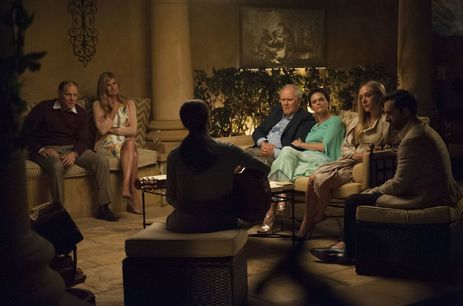B- | A hippie shares a meal with her rich opposites. Directed by Miguel Arteta Starring Salma Hayek, John Lithgow, and Connie Britton Initial Review by Jon Kissel |

Despite their vast difference in wealth, Beatriz and Kathy are believable as friends. Britton has no problem getting her inherent warmth across, and Hayek is so, so earnest in the role. When the guests arrive, however, there’s no scenario imaginable where Beatriz makes friends with any of them. Grasping couple Shannon (Chloe Sevigny) and Alex (Jay Duplass) are boring and insufferable, but neither holds a candle to Doug Strutt (John Lithgow), a toxic combination of Trump and Rush Limbaugh. The character is a ball of conservative tics and habits that are enough to irritate every ideological branch of the predominantly liberal audience who would watch, or even be aware of, a small independent movie. Strutt’s a big-game hunter, a presumptuous racist, a rapacious developer, and a hubristic capitalist who assumes he is good because he is rich. Arteta generates conflict just by putting Beatriz in a room with him, but ratchets it up on the possibility that he is the developer who ravaged her Mexican hometown with tourist trap hotels. Throw in more alcohol than Beatriz usually consumes, and anything can happen.
It’s easy to make Strutt into a villain, and Arteta and Lithgow effortlessly do so. It’s appreciated that Strutt’s given some recalibration in small moments, but what I appreciate most about Beatriz at Dinner is the film’s placement of Beatriz as an equally flawed individual, though the film obviously prefers one to the other. Mike White, who wrote the script, proved his female antihero bona fides with Enlightened, a show I didn’t watch but is raved about by TV critics, and he continues in that vein here. I can tolerate Beatriz’s laughable vocation because the film brilliantly makes Beatriz unreliable in her self-image.
Some of what follows is extra-textual and informed by my skepticism, but here goes. The film shows that Beatriz is a good masseuse. That’s fine and believable. However, her training in magic elevates that skill beyond expertise and into a Spider-man-esque calling. With great laying-on-hands power comes great responsibility. That kind of delusion and self-importance has made her pompous, something White, Arteta, and Hayek display at every opportunity. She talks in long paragraphs, losing her audience not because they’re bad people (though they are), but because she’s saying nothing while imagining herself saying everything. For all her perceived enlightenment, she can’t recognize that her interminable yammerings are inconveniencing a fellow working class member when the waiter’s trying to take orders. Her offers of free treatments, to this viewer, are insults. Hayek is as good as she’s ever been in the multifaceted role. I was terrified that this was going be woo hagiography, wherein her chosen profession automatically makes her a saint, and was relieved to be in the hands of better filmmakers and actors than I expected.
Despite how irritiating Beatriz is, what she’s doing is simply not as bad as what her dinner guests are doing. The rise of alt-med is about filling a niche the medical community is leaving open, namely making patients feel cared for. Even if the methods are bunk and make society stupider and ultimately endanger people, the root impulse of the practitioner is admirable in spite of their laziness and credulity. Its opposite, sheer consumption, has all of the negative effects on society without even the scrim of charitable impulse. Beatriz is constantly seeing evidence of consumption all around her, from black spots in the ocean to dreams of red poison pluming up to the surface. For those who listened to our most recent podcast episode (and I know everyone did), I mentioned that a rising theme for 2018 film is despair and resignation towards a world and community irrevocably in decline. Beatriz at Dinner shares that theme, especially with its bleak ending. The land gets razed. Oversized developments go up. Rhinos get hunted to extinction (largely because of alt-med demand for therapeutically-useless rhino horn, but I doubt Beatriz knows that). All that’s left is to contemplate a cherished dead goat, and walk into the ocean.
Beatriz at Dinner transcends my low expectation and leaves me with a compact and challenging film. These kind of dialogue-heavy chamber dramas that could pass as plays are plentiful if one casts a cinematic net into underseen indies, and Arteta’s version is better than most. The last several scenes strike me as manipulative, but any time I can spend 90 minutes with a philosophical enemy and not come away enraged is an impressive feat. B
 RSS Feed
RSS Feed